27.04.2014
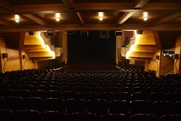
Théâtre Le Palace
8, Rue du Faubourg Montmartre, 75009 Paris, (M. Grands Boulevards)
8, Rue du Faubourg Montmartre, 75009 Paris, (M. Grands Boulevards)
19.30 Opening ceremony
-
Address of Mr. Jordan Plevnes,
President of “SEE a Paris”
- Address of Mr. Yves Boisset, Honorary President of SEE a Paris
- Address of Ms. Irina Bokova, General director of UNESCO
- Address of Ms. Irena Radovic, Ambassador of Montenegro in France
- Presentation of the jury members: Yves Boisset, Emmanuelle Galabru, Sacha Goldman, Zoran Zivkovic, Hazis Vardar
- Homage of Zivko Nikolic, Montenegro filmmaker (1941-2001)
- Proclamation of SEE Personality, Mr. Zivko Mukaetov, General director of Alkaloid
- Proclamation of Europa Prima Award, Mr. Marc Delouze
- Proclamation of SEE Actor, Mr. Emir Hadzihafisbegovic
- Address of Mr. Yves Boisset, Honorary President of SEE a Paris
- Address of Ms. Irina Bokova, General director of UNESCO
- Address of Ms. Irena Radovic, Ambassador of Montenegro in France
- Presentation of the jury members: Yves Boisset, Emmanuelle Galabru, Sacha Goldman, Zoran Zivkovic, Hazis Vardar
- Homage of Zivko Nikolic, Montenegro filmmaker (1941-2001)
- Proclamation of SEE Personality, Mr. Zivko Mukaetov, General director of Alkaloid
- Proclamation of Europa Prima Award, Mr. Marc Delouze
- Proclamation of SEE Actor, Mr. Emir Hadzihafisbegovic
20.00 "Falsifier", Serbia, dir. Goran Markovic, 87 min.
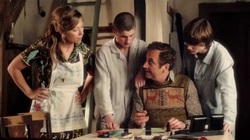
Andjelko is the principal of a middle school in a small Bosnian place Dubica. He believes in Yugoslavia and worships its leader Josip Broz Tito. Andjelko, however, has one serious fault: he is a forger, he makes forged school diplomas. He does not do this out of self-interest, but because he is a staunch philanthropist. One day, a neighbor for whom Andjelko forged the leather-working school diploma, in order to take revenge on the local veterinarian, reports to the police that this one too has Andjelko’s diploma. Our hero, therefore, is forced to run but he is caught and ends up in jail. Was his only mistake to have been doing it for free? Our story takes place at the end of the 1960s. This is the time of the collapse of the ideals of a more just and honorable life and of the beginning of the end of an equally grand illusion called Yugoslavia.
28.04.2014
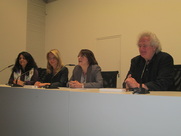
INALCO
65 rue des Grands Moulins, 75013 Paris, (M. Bibliothèque François Mitterrand)
65 rue des Grands Moulins, 75013 Paris, (M. Bibliothèque François Mitterrand)
10.00 Academic ceremony
Participants:
- Ms. Frosa Pejovska Bouchereau, INALCO, Department of Central and oriental Europe
- Mr. Jordan Plevnes, President of SEE a Paris
- Mr. Yves Boisset, President of Honor of SEE a Paris
- Ms. Manuelle Franck, President of INALCO
- Ms. Irena Radovic, Ambassador of Montenegro in France
- Mr. Jérôme Coumet, Mayor of 13th arrondissement of Paris
- Mr. Stephan Doempke, Cultural Heritage without Borders"
- Mr. Nikolay Stojanov, Balkanika Foundation, "Importance of Balkanika for the culture of South-East Europe"
- Mr. Frank Morawietz, OFAJ, "Cultural and educational projects of youth from South-East Europe"
- Mr. Bujar Luma - Loja, Center for Balkan Cooperation, Tetovo
- Mr. Eric Le Roy, CNC, President of FIAF (International Federation of Film Archives)
- Ms. Frosa Pejovska Bouchereau, INALCO, Department of Central and oriental Europe
- Mr. Jordan Plevnes, President of SEE a Paris
- Mr. Yves Boisset, President of Honor of SEE a Paris
- Ms. Manuelle Franck, President of INALCO
- Ms. Irena Radovic, Ambassador of Montenegro in France
- Mr. Jérôme Coumet, Mayor of 13th arrondissement of Paris
- Mr. Stephan Doempke, Cultural Heritage without Borders"
- Mr. Nikolay Stojanov, Balkanika Foundation, "Importance of Balkanika for the culture of South-East Europe"
- Mr. Frank Morawietz, OFAJ, "Cultural and educational projects of youth from South-East Europe"
- Mr. Bujar Luma - Loja, Center for Balkan Cooperation, Tetovo
- Mr. Eric Le Roy, CNC, President of FIAF (International Federation of Film Archives)
10.40 "Manaki Brothers", 20 min.
Inserts from documentary films by first cinematographers on the Balkans (screening in cooperation with Macedonian Cinematheque).
11.00 "My father Izet",dir. Blagoj Markovski, written by Ljube Cvetanovski, 60 min.
An exciting documentary film of an offspring of a French soldier who fought in Macedonia in the First World War.
12.00 SEE Exhibition: "One day with Omer Kaleshi"
15.00 "Homage of Zivko Nikolic", Montenegro, dir. Branko Baletic, 60 min.
16.00 Debate: "100 years from the World War I and today's perspective of the
countries from SEE region"
- Introduction: Mr. Luan Starova, Macedonian Academy of Science and Art, "LA GRANDE GUERRE DANS UNE PETITE GUERRE BALKANIQUE"
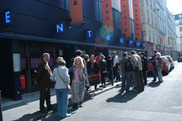
L'Entrepôt
7/9 rue Francis de Pressensé, 75014 Paris, (M. Pernety)
7/9 rue Francis de Pressensé, 75014 Paris, (M. Pernety)
18.00 "Vegetarian cannibal", Croatia, dir. Branko Schmidt, 85 min.
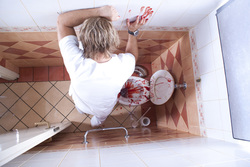
Danko Babić is a gynecologist at a leading Croatian gynecology and sterility clinic. Unscrupulously ambitious, corrupt and immoral, he is connected with the Zagreb organized crime of the lowest kind and ready to do anything to acquire money and power in the clinic. Superficial and rash in his work, he commits a series of fatal mistakes resulting in death of a pregnant patient, extraction of healthy organs, etc. He is saved from total embarrassment and jail sentence by corrupt pathologists and his friend, a policeman named Ilija, a hardcore drug dealer. Constantly balancing on the edge of a prison sentence, Babić yields himself to drug and alcohol abuse, often shooting himself up with tranquilizers and sleeping medicament. With lies and forged test results, Babić manages to discredit his colleagues and becomes the head of the clinic. And just when Dr. Babić seemingly manages to fulfill all his goals, a mob boss, Jedinko, asks him to perform an abortion on a woman who is seven month pregnant carrying a child of the Minister of Transport...
20.00 "Withering", Serbia, dir. Milos Pusic, 109 min.
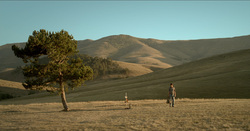
Janko comes home to his godforsaken village after several years of living in Belgrade, where he worked hard for little money . His mountain village has become almost deserted and Janko's intention is to sell his land and go to work in Switzerland, believing that he would finally get out of financial problems and find his place under the sun.
His lonely mother Milica (50) has been hoping for a long time that Janko would be back with a wife and have a family there. She will do everything to make him change his mind.
Strahinja, a lonely inhabitant of the deserted village, and an idealist, but a man full of strength and the will to live is helping Milica. After the tragic death of his son, he closed the tavern he was running, his daughter became an alcoholic and his wife stopped talking to him as if she were punishing herself.
Although Milica will do her best to persuade Janko to stay and try to live on and off of his land, and although Strahinja will offer him to run the tavern together and split the profits 50-50, Janko will not give up on his plan. He is willing to do anything to secure his future — even to sell his fathers grave.
His lonely mother Milica (50) has been hoping for a long time that Janko would be back with a wife and have a family there. She will do everything to make him change his mind.
Strahinja, a lonely inhabitant of the deserted village, and an idealist, but a man full of strength and the will to live is helping Milica. After the tragic death of his son, he closed the tavern he was running, his daughter became an alcoholic and his wife stopped talking to him as if she were punishing herself.
Although Milica will do her best to persuade Janko to stay and try to live on and off of his land, and although Strahinja will offer him to run the tavern together and split the profits 50-50, Janko will not give up on his plan. He is willing to do anything to secure his future — even to sell his fathers grave.
29.04.2014
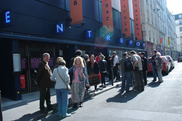
L'Entrepôt
7/9 rue Francis de Pressensé, 75014 Paris, (M. Pernety)
7/9 rue Francis de Pressensé, 75014 Paris, (M. Pernety)
16.00 Screening of documentary films
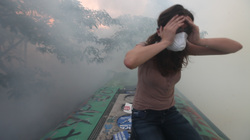
"Living with Leviathan", dir. Şirin Bahar Demirel, Turkey, documentary, 12 min.
When ordinary people who share funny cat videos on the social media start to spread information about what to do in case of being taken into custody, it is called state terrorism. This is a personal story about a nationwide uprising, the Occupy Gezi movement in Turkey, in the summer of 2013. More of an open letter than a documentary, this movie tries to show how Turkish youth say ‘No!’ to the despotic regime and the police brutality.
When ordinary people who share funny cat videos on the social media start to spread information about what to do in case of being taken into custody, it is called state terrorism. This is a personal story about a nationwide uprising, the Occupy Gezi movement in Turkey, in the summer of 2013. More of an open letter than a documentary, this movie tries to show how Turkish youth say ‘No!’ to the despotic regime and the police brutality.
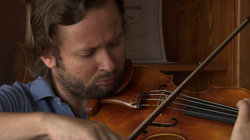
"Sound seekers", dir. Suzana Dinevski, Macedonia, documentary, 29 min.
A story on the bond of love between a father and his son, the Macedonian Stradivari from Veles, Svetozar Bogdanoski, and his son Kostadin, a Concertino Asociado at the Gran Theatre del Liceu, in Barcelona and their shared passion for the violin, its tone, and the power of music. Svetozar has never left Veles, rarely leaves his workshop, and has never heard the tone of one of his violins in a concert hall. He has never seen his son play one of his instruments with an orchestra, either. And Kostadin exclusively plays the violins made by his father.
A story on the bond of love between a father and his son, the Macedonian Stradivari from Veles, Svetozar Bogdanoski, and his son Kostadin, a Concertino Asociado at the Gran Theatre del Liceu, in Barcelona and their shared passion for the violin, its tone, and the power of music. Svetozar has never left Veles, rarely leaves his workshop, and has never heard the tone of one of his violins in a concert hall. He has never seen his son play one of his instruments with an orchestra, either. And Kostadin exclusively plays the violins made by his father.
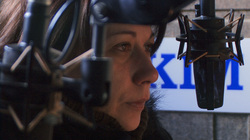
"Kosma", dir. Sonja Blagojevic, Serbia, 75 min.
For ten years now, the KOSMA radio network is the only thing connecting highly isolated Serbian communities in Kosovo. The sound of the radio travels through deserted areas and abandoned houses, breaking thus the barriers that their listeners themselves cannot surmount. Electricity and water cutoffs, fear, helicopters flying over, attacks and protests are woven into simple human stories, acts and aspirations. In this place laden with rich and vivid history and tradition, the radio voices bear witness to everyday life, human connections, significant events and ever-present hope.
For ten years now, the KOSMA radio network is the only thing connecting highly isolated Serbian communities in Kosovo. The sound of the radio travels through deserted areas and abandoned houses, breaking thus the barriers that their listeners themselves cannot surmount. Electricity and water cutoffs, fear, helicopters flying over, attacks and protests are woven into simple human stories, acts and aspirations. In this place laden with rich and vivid history and tradition, the radio voices bear witness to everyday life, human connections, significant events and ever-present hope.
18.00 Screening of documentary films
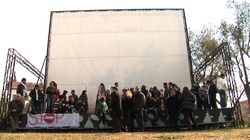
"Not a car-wash", dir. Gentian Koci, Albania, documentary, 50 min.
Tirana, Albania. On the grounds where the country’s first film studio once lay, film director Kujtim Cashku has established a pioneering film school. It soon becomes a hub for the country’s artistic community – in a country notably lacking in cultural outlets. The trouble is, the land that the film school is on, is now being eyed up by the corporations beginning to invest in the former communist country. And the police, at the behest of the government, are only too eager to storm in and shut the film school down. We follow the action over four tense days as a press conference evolves into a full blown occupation, and the police advance with determination on outraged students and professors. On this small battleground, a very big question is being asked – just what role should the state have in nurturing – or destroying – a nation’s cultural heart?
Tirana, Albania. On the grounds where the country’s first film studio once lay, film director Kujtim Cashku has established a pioneering film school. It soon becomes a hub for the country’s artistic community – in a country notably lacking in cultural outlets. The trouble is, the land that the film school is on, is now being eyed up by the corporations beginning to invest in the former communist country. And the police, at the behest of the government, are only too eager to storm in and shut the film school down. We follow the action over four tense days as a press conference evolves into a full blown occupation, and the police advance with determination on outraged students and professors. On this small battleground, a very big question is being asked – just what role should the state have in nurturing – or destroying – a nation’s cultural heart?
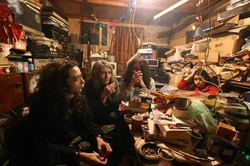
"He who travels alone", Ralitza Dimitrova, Bulgaria, documentary, 72 min.
A counter-culture Bulgarian family flees society on their chaotic Noah's Ark built inside a moldy basement in downtown Sofia. The father, a former hippie-turned-messiah to this micro-community, preaches his vision of a unique and perfectly harmonious family life in contradiction to all social norms. The film is an intimate, yet discreet examination of this family that spans over a decade. During that period, James, the wunderkind artist who at the age of six hosts regular exhibitions, turns into a lonely nude model for art students, but still manages to publish a mystical novel and invent an eternal engine. Devoted to the pursuit spiritual growth, James’s family has exiled itself into its eccentricity. By observing the everyday side of their journey, the film poses questions about the meaning of social living and its alternatives, about the role of the family and the boundaries of personal choice.
A counter-culture Bulgarian family flees society on their chaotic Noah's Ark built inside a moldy basement in downtown Sofia. The father, a former hippie-turned-messiah to this micro-community, preaches his vision of a unique and perfectly harmonious family life in contradiction to all social norms. The film is an intimate, yet discreet examination of this family that spans over a decade. During that period, James, the wunderkind artist who at the age of six hosts regular exhibitions, turns into a lonely nude model for art students, but still manages to publish a mystical novel and invent an eternal engine. Devoted to the pursuit spiritual growth, James’s family has exiled itself into its eccentricity. By observing the everyday side of their journey, the film poses questions about the meaning of social living and its alternatives, about the role of the family and the boundaries of personal choice.
18.30 Literary event: "SEE a Paris - Paris a SEE"
- Special guest: Minister of culture of France, Ms. Aurelie Filippetti
- Honorary guests: Tomas Salamun, Marko Sosic and Zdenka Stimac, Publisher Edicion Franco-Sloven
- Participants: Marc Delouze, Michel Lecour, Francis Combes, Luan Rama, Louis Porquet, Hughues Labrouse, Teruko Yamazaki, Laure Cambau,
Alain Lance, Jean-Pierre Rousseau
- Honorary guests: Tomas Salamun, Marko Sosic and Zdenka Stimac, Publisher Edicion Franco-Sloven
- Participants: Marc Delouze, Michel Lecour, Francis Combes, Luan Rama, Louis Porquet, Hughues Labrouse, Teruko Yamazaki, Laure Cambau,
Alain Lance, Jean-Pierre Rousseau
20.00 "Chefurs raus", Slovenia, dir. Goran Vojnovic, 100 min.
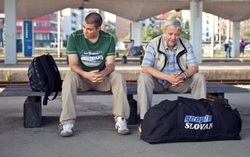
Marko, Adi, Aco and Dejan hang out in front of block of flats in Fužine. Marko is pissed because he quit playing basketball and because the sexy TV presenter doesn’t notice him and because his father Radovan is going to beat him up for quitting basketball. Adi is irritated by the fact that his brother Sanel is a drug addict and because his father Mirsad prefers to shag waitresses somewhere in Austria rather than to deal with this. Makarovićka – a chefur girl gives a hard time to Aco and Aco would like to take a revenge on Damjanović – the bus driver. Dejan is anxious because his mother Sonja wants to move to Slovenske Konjice. Policemen stop the boys one night. And their world starts to disintegrate.
“We tend to forget how fragile and vulnerable the immigrant families are. Living abroad they are cut off not only from their culture, but also from their relatives and friends. Children are often out on a limb, because their parents feel helpless just like their kids do. They are all lost in the world of rules unclear to them, and of different social norms and customs. The parents hardly know what is right, what is allowed and what not, so they cannot teach and advise their children. And so the kids are left to the street and its ‘rules’.”
“We tend to forget how fragile and vulnerable the immigrant families are. Living abroad they are cut off not only from their culture, but also from their relatives and friends. Children are often out on a limb, because their parents feel helpless just like their kids do. They are all lost in the world of rules unclear to them, and of different social norms and customs. The parents hardly know what is right, what is allowed and what not, so they cannot teach and advise their children. And so the kids are left to the street and its ‘rules’.”
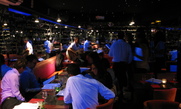
20.00 Selection of short and animated films
- Ukronija, Serbia, dir. Marko Backovic, 30 min.
- 5 Ways 2 Die, Cyprus, dir. Daina Papadaki, 17 min.
- First yugoslavian cosmonaut, Serbia, dir. Rene Nuijens, 4 min.
- Yellow parasol, Croatia, dir. Ana Opacic, 21 min.
- Roadtrip, Macedonia, dir. Zarko Ivanovski, 7 min.
- Sepideh, Greece, dir. Fani Konstantinou, 15 min.
- The Writing machine, Montenegro, dir. Senad Šahmanović, 20 min
- Great rivals, Greece, dir. Theodoros Iliopoulos, 6 min.
- Goran, Serbia, dir. Roberto Santaguida, 11 min.
- Loverinth, Macedonia, dir. Branko Kosteski, Ana Jakimska, 6 min.
- 5 Ways 2 Die, Cyprus, dir. Daina Papadaki, 17 min.
- First yugoslavian cosmonaut, Serbia, dir. Rene Nuijens, 4 min.
- Yellow parasol, Croatia, dir. Ana Opacic, 21 min.
- Roadtrip, Macedonia, dir. Zarko Ivanovski, 7 min.
- Sepideh, Greece, dir. Fani Konstantinou, 15 min.
- The Writing machine, Montenegro, dir. Senad Šahmanović, 20 min
- Great rivals, Greece, dir. Theodoros Iliopoulos, 6 min.
- Goran, Serbia, dir. Roberto Santaguida, 11 min.
- Loverinth, Macedonia, dir. Branko Kosteski, Ana Jakimska, 6 min.
22.30 Selection of short and animated films
- Kylan, Serbia, dir. Miko Lazic, 10 min.
- Complicated reality, Turkey, dir. Sadik Demiroz, 6 min
- A Small Time/Space Discontinuum, Macedonia, dir. Goce Cvetanovski, 14 min.
- One way or another, Turkey, dir. Naz Salih 11 min.
- Fated, Kosovo, dir. Blerim Gjoci, 25 min.
- The Girl Who Loved Fairy-tales, Croatia, dir. Cejen Cernic, 4 min.
- Family thrill, Greece, dir. Dimitris Stratakis, 15 min.
- Siber, Turkey, dir. Hasan Kiliç, 4 min.
- Complicated reality, Turkey, dir. Sadik Demiroz, 6 min
- A Small Time/Space Discontinuum, Macedonia, dir. Goce Cvetanovski, 14 min.
- One way or another, Turkey, dir. Naz Salih 11 min.
- Fated, Kosovo, dir. Blerim Gjoci, 25 min.
- The Girl Who Loved Fairy-tales, Croatia, dir. Cejen Cernic, 4 min.
- Family thrill, Greece, dir. Dimitris Stratakis, 15 min.
- Siber, Turkey, dir. Hasan Kiliç, 4 min.
30.04.2014
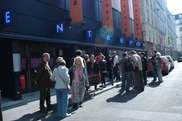
L'Entrepôt
7/9 rue Francis de Pressensé, 75014 Paris, (M. Pernety)
7/9 rue Francis de Pressensé, 75014 Paris, (M. Pernety)
16.00 Off program
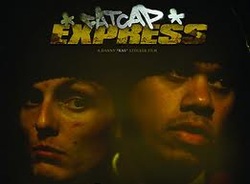
"Fatcap Express", Netherlands, dir. Danny Stolker, 70 min.
Fatcap Express is a film about graffiti writers Geoffrey and Vincent from Rotterdam (the Netherlands). Geoffrey is really reckless with a hunger for respect. Vincent is very thought out. Both unleash their writing skills on trains and walls. Due to a series of events Geoffrey’s perspective changes throughout the story. This movie gives you a realistic, inside view in the world of graffiti art. Most outsiders don’t even pay attention to the work, let alone think about what motivates one to make it.
Fatcap Express is a film about graffiti writers Geoffrey and Vincent from Rotterdam (the Netherlands). Geoffrey is really reckless with a hunger for respect. Vincent is very thought out. Both unleash their writing skills on trains and walls. Due to a series of events Geoffrey’s perspective changes throughout the story. This movie gives you a realistic, inside view in the world of graffiti art. Most outsiders don’t even pay attention to the work, let alone think about what motivates one to make it.
17.15 Selection of short and animated films
- Ziazan, Turkey, dir. Derya Durmaz 15 min.
- The blood, Bulgaria, dir. Velislava Gospodinova, 7 min.
- Photography, Kosovo, dir. Jeton Ahmetaj, 5 min.
- Good time to die, Macedonia, dir. Senad Abduli, 18 min.
- Global village, Bosnia, dir. Berin Tuzlic, 2 min.
- The Dinner, Greece, dir. Dimitris Argyriou, 11 min.
- Duminca, Romania, dir. Sinziana Nicola, 13 min.
- A perfect day, Turkey, dir. Oguzhan Kaya, 5 min.
- The blood, Bulgaria, dir. Velislava Gospodinova, 7 min.
- Photography, Kosovo, dir. Jeton Ahmetaj, 5 min.
- Good time to die, Macedonia, dir. Senad Abduli, 18 min.
- Global village, Bosnia, dir. Berin Tuzlic, 2 min.
- The Dinner, Greece, dir. Dimitris Argyriou, 11 min.
- Duminca, Romania, dir. Sinziana Nicola, 13 min.
- A perfect day, Turkey, dir. Oguzhan Kaya, 5 min.
18.30 Screening of documentary films
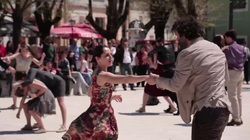
"Some limitless freedom", Montenegro, dir. Marija Perović, documentary, 22 min.
Young actors by gesture and dance freed their emotions, loneliness, uncertainty, need for closeness, fear of closeness… It's about trying to overcome the lack of communication. When the words are powerless, the dancing begins. Motive, celebrating the Dance day, trough animation and invisible dance theater, is important for the montage finale of the film, but the main motive became the nonverbal account on releasing the emotions… We filmed making of the choreography performance “Listen to what I'm going to dance”, capturing emotions, relations, gesture, movement, dance, moments when a non-verbal becomes more important, more powerful than verbal.
Young actors by gesture and dance freed their emotions, loneliness, uncertainty, need for closeness, fear of closeness… It's about trying to overcome the lack of communication. When the words are powerless, the dancing begins. Motive, celebrating the Dance day, trough animation and invisible dance theater, is important for the montage finale of the film, but the main motive became the nonverbal account on releasing the emotions… We filmed making of the choreography performance “Listen to what I'm going to dance”, capturing emotions, relations, gesture, movement, dance, moments when a non-verbal becomes more important, more powerful than verbal.
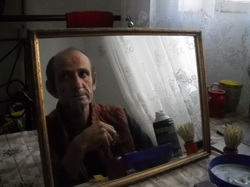
"Pursuit of luck", Macedonia, dir. Marija Dzidzeva, documentary, 66 min.
Eight single men, full of hope, departed on a long journey to Moscow to pursue the luck. How strong is their faith that the salvation could be in a woman? And what could a woman do for love? The Pursuit of Luck is a documentary film consisting of 3 stories (Hope, Faith and Love) in which the destinies of the main protagonists intertwine in their efforts to find happiness.
Eight single men, full of hope, departed on a long journey to Moscow to pursue the luck. How strong is their faith that the salvation could be in a woman? And what could a woman do for love? The Pursuit of Luck is a documentary film consisting of 3 stories (Hope, Faith and Love) in which the destinies of the main protagonists intertwine in their efforts to find happiness.
20.00 "Sonja and the bull", Croatia, dir. Vlatka Vorkapic, 106 min.
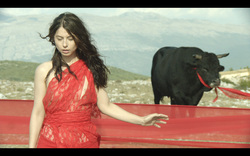
Truck stops at the border between Croatia and Bosnia and Herzegovina: four men are transporting Garonja the bull to a pre-arranged bullfight in Croatia. They don’t have the necessary documents, but Stipe comes up with a solution: they will let Garonja to cross the border on his own while grazing. Who will request a passport from an animal?!
Sonja, a vegetarian and animal-rights activist, from Zagreb, is a declared bullfighting opponent. People in Zagora watch disapprovingly as she accuses them of cruelty to bulls on national TV. A bet is placed that Sonja will not have the guts to come closer than three meters to Garonja the bull. Stipe, Garonja’s owner, is so sure she will not do it that he places a bizarre wager – his balls. Sonja’s main challenge is Ante, the son of the top bull fights organizer, and an insurance agent known for his power of persuasion.
Sonja, a vegetarian and animal-rights activist, from Zagreb, is a declared bullfighting opponent. People in Zagora watch disapprovingly as she accuses them of cruelty to bulls on national TV. A bet is placed that Sonja will not have the guts to come closer than three meters to Garonja the bull. Stipe, Garonja’s owner, is so sure she will not do it that he places a bizarre wager – his balls. Sonja’s main challenge is Ante, the son of the top bull fights organizer, and an insurance agent known for his power of persuasion.
22.00 Concert: Kudsi Erguner
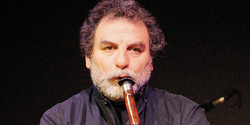
Kudsi Ergüner (born 1952) is a Turkish musician. He is considered a master of traditional Mevlevi Sufi music and is one of the best-known players of the Turkish ney flute.In the seventies Kudsi Erguner moved to Paris where, at the beginning of the eighties, he founded the Mevlana Institute devoted to the study and teaching of classical Sufi music. Together with the Kudsi Erguner Ensemble he developed deep insights into the diversity of his culture: the group conveys both authentic, often improvised forms of expression of classical Ottoman performance culture as well as a comprehensive repertoire of modern and classical pieces that can be traced back to the 13th century. In addition to his own recordings, Erguner has performed with Peter Gabriel, Jean Michel Jarre, Maurice Bejart, Didier Lockwood and others.

